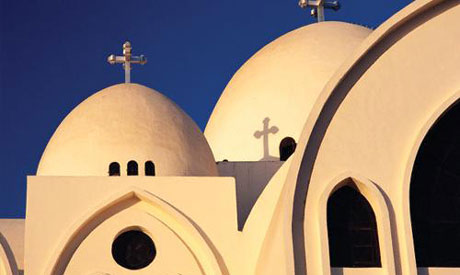 Sami Metwaly, security director for the governate of Minya, says the deadly violence that erupted in the area on Thursday and Friday was not originally sectarian, though some incitements made it appear to be.
Sami Metwaly, security director for the governate of Minya, says the deadly violence that erupted in the area on Thursday and Friday was not originally sectarian, though some incitements made it appear to be.
Metwaly's statement directly contradicts the narrative offered by the Coptic Orthodox Archbishopric of Minya. A statement released by the Archbishopric earlier states that the events began with a dispute between a Muslim and a Christian over the construction of a wall in the Nazlet Abeed village, located around 6 kilometres from the city of Minya. According to the statement, the dispute then escalated into sectarian clashes.
Speaking to Al-Ahram's Arabic news portal, Metwaly said tensions started when a Muslim girl fled home in Minya and hid at the house of a Coptic family located in Cairo's Ezbet El-Nagkhl to escape from her father with the help of two Coptic young men, without specifying the reason.
The girl's father, according to Metwaly, found her in the Copts' home and subsequently forced her to go through medical check-up to make ensure that she was still a virgin.
"Usually in such cases fathers opt not to make a scene to avoid a possible scandal, but some people who want to ignite sectarian strife convinced him to confront the two Copts," Metwaly explained.
"Her father, brothers and other relatives of hers went to the house of the two Copts to confront them about their inappropriate behavior, and verbal exchange devolved into violent conflict. Rounds were fired, resulting in a death and an injury... they have both been arrested."
At least three people were killed and several injured in the scuffle late Thursday, reported Al-Ahram's Arabic website. Two of the dead were Muslim and one was Christian.
Clashes resumed on Friday, leaving four more injured, including a child, before security forces contained the situation.
Copts Without Borders said Friday that army chief Abdel-Fattah El-Sisi is responsible for protecting Egyptian Christians following the "public mandate" that he was given when millions took to the streets in response to his calls for popular support to "fight terrorism," referring to the mobilization of supporters of former president Mohamed Morsi.
The group also stated that ten houses owned by Copts had been torched and destroyed, while more than 60 more had been ravished. The statement added that four Copts were in critical conditions after being hospitalized following the violence on Thursday and Friday.
Copts Without Borders argued that violence erupted because of a "rumour" about a relationship between a Coptic boy and a Muslim girl.
In previous sectarian incidents in Egypt, similar allegations have ignited violent sectarian strife. In May 2011, for instance, a woman was allegedly held by Coptic churches in Cairo after converting to Islam, and the story enflamed sectarian violence in Imbaba that left 12 dead and 240 injured.
In July and August, security forces' dispersal of protest camps held by supporters of ousted president Mohamed Morsi led to a wave of attacks on Coptic churches nationwide. In the town of Delga in the Minya governorate, a monastery, three churches and several Christian-owned properties were set on fire. Security forces entered the town in September and restored order.



